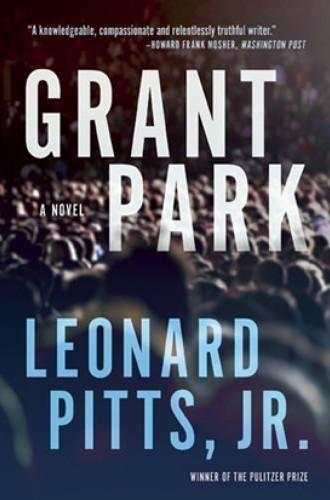A didactic, irresistible novel
Leonard Pitts's story is so compelling that you barely notice how much you're learning.
It is Tuesday, November 4, 2008: a historic election day. Will America soon have its first African-American president?
In Leonard Pitts’s novel, Malcolm Marcus Toussaint is a 60-year-old black newspaper journalist who doesn’t think so. Out of patience, out of faith, out of sorts, he has given up “the foolish notion that white people can be redeemed.” He is tired of explaining “the same things to white people, year in, year out, over and over again . . . and them not listening.” He still has enough energy, however, to defy his employer and sneak a furious rant onto the front page of the morning edition—an act that immediately gets both him and his boss fired.
Dwayne McLarty and Clarence Pym, a mismatched pair of white supremacists, don’t think Barack Obama will win the presidency either. McLarty, a meth addict, and Pym, a loner with a disfiguring disease, want to take America back from blacks, Jews, Muslims, and gays. Whoever wins the election, they plan to send a wake-up call to white Christian America by bombing the crowd awaiting election returns in Chicago’s Grant Park.
Read our latest issue or browse back issues.
The story takes off when McLarty and Pym kidnap Toussaint.
After the paperback edition of Grant Park was published and Donald Trump was elected president, I went to hear Pitts discuss his novel at a public library. “First, I need to be clear about one thing,” he said: “I am not Malcolm Toussaint.”
But it’s easy to see why readers might confuse the two: both are Pulitzer Prize–winning African-American journalists; both have written extensively on race; both can be angry. In fact, Pitts began his library presentation by reading from a recent and clearly angry column: “I have no interest in seeing this country heal” after “the election of a fundamentally unsound, unserious and unfit man,” he wrote. He referred to Trump as “a misogynist who brags about sexual assault, a bigot cheered to victory by the Ku Klux Klan.”
The good guys in Grant Park are far from perfect, though they sincerely want to make the world a better place. Malcolm, a sanitation worker’s son from Memphis, is hot-headed and impatient. In 1968 he was sent home from a prestigious northern university for having painted an obscene slogan on a campus wall. Nonviolent protest was too tame for him: he wanted justice now and was willing to break windows and loot stores to get it. Forty years later, as a celebrated columnist, he downs a few beers and explodes in print.
Malcolm’s white boss, Bob Carson, a dentist’s son from Minneapolis, is obtuse and disillusioned. In 1968 he considered himself a revolutionary. Though in love with an African-American woman, he repeatedly offended her with his assumptions of white privilege. Forty years later, Bob fears he has become the man he never wanted to be: a racist. He has lost patience with black people “constantly whining about this injustice or that unfairness.” Nowadays, he thinks, a black man can be rich, famous, even a candidate for president. What more do African Americans want?
Two women play important supporting. Like Malcolm and Bob, Janeka Lattimore marched in Memphis in 1968. A sixtyish black woman, she works on minority outreach for Obama and tries to help Bob understand how the world looks to African Americans. Amy Landingham is a young white journalist at the Post. She carefully pays attention to other people’s experiences and feelings. When Malcolm speaks, she listens. When need arises, she acts.
Yes, Grant Park is a didactic novel. In a pivotal scene in which Malcolm shares a boiled egg with Martin Luther King Jr., for example, the civil rights leader kindly and patiently explains to Malcolm why violence is not the answer. When Bob and Janeka meet for lunch 40 years after their breakup, the black woman kindly and patiently listens to the white man’s outbursts about race, occasionally interjecting to show where he has gone off track.
Some readers may fault Pitts for his obvious attempts to educate; I found the story so compelling that I barely noticed how much I was learning. Grant Park is about lovers with irreconcilable differences who nevertheless continue to reach out to each other. It’s about fathers and sons whose mutual loyalty survives the collision of their separate worlds. Above all, it’s a fast-paced thriller with guns, bombs, explosions, drugs, speeding cars, and homicide. This book will keep you up past your bedtime.
It will also leave you wondering what America has accomplished over the last half-century.
The day before the 2008 election, Malcolm says he’s “sick and tired of white folks’ bullshit.” After the votes are tallied and Obama becomes president-elect, Bob rejoices that the country is changing. “All that old racial stuff, we’re moving beyond that,” he exults. For Bob’s sake, Malcolm tries to believe him.
If the characters were transported to 2017, no doubt Bob would be astonished at the election of Trump, whereas Malcolm would not be even mildly surprised.
As I write, yet another jury has refused to convict a police officer for shooting an unarmed, fleeing black man. In a December 6 column, Pitts wrote, “Lord, I am just tired. . . . You get tired of being disappointed, you know? You get sick of being let down.”
“I know that probably, eventually, my elders will beguile me back into faith, convince me there are reasons to keep hammering at America’s ideals, or stand for America’s song,” Pitts wrote. “But in this moment of fresh betrayal? Sorry, elders. I’m damned if I can think of one.”







